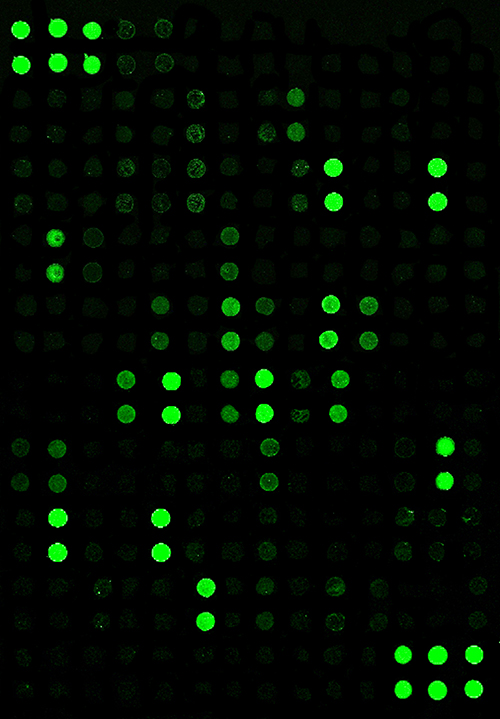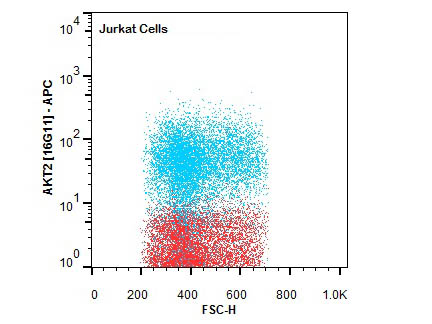 In a previous post, I introduced several biomarker arrays & assays, companion tools for biomarker discovery, monitoring and quantification. Today, I will focus more specifically on high density proteomics microarrays. This post aims at helping you understand what services are available in this domain and how they could fit within your project.
In a previous post, I introduced several biomarker arrays & assays, companion tools for biomarker discovery, monitoring and quantification. Today, I will focus more specifically on high density proteomics microarrays. This post aims at helping you understand what services are available in this domain and how they could fit within your project.
Indeed, tebu-bio has just been appointed by RayBiotech as one of the 3 companies worldwide to perform contract research on their recently developed higher density proteomics tools. A good opportunity to talk about this!
If your aim is to fish for biomarkers with a very broad array of proteins, the newly released high density human, mouse or rat microarrays are a very good pick for you. These arrays are the ones providing the broader range of analytes on the market (1000 for human, 200 for mouse and 67 for rat).
 Spotted on glass slides, the arrays are based on sandwich antibody pair technology providing higher specificity, with fluorescence detection for increased sensitivity. Each slide accommodates 40 analytes on 16 arrays which can be incubated with either 16 samples (for a profiling study) or a combination of samples and standard mix (for quantitation).
Spotted on glass slides, the arrays are based on sandwich antibody pair technology providing higher specificity, with fluorescence detection for increased sensitivity. Each slide accommodates 40 analytes on 16 arrays which can be incubated with either 16 samples (for a profiling study) or a combination of samples and standard mix (for quantitation).
 At the stage of “fishing” for biomarkers, I would highly recommend using the full high density array as a profiling tool (as opposed to quantification), where you will benefit from the 16 arrays per slide to test your samples and compare them versus your control group (e.g. diseased versus healthy patients, treated versus placebo group, normal versus KO mice…).
At the stage of “fishing” for biomarkers, I would highly recommend using the full high density array as a profiling tool (as opposed to quantification), where you will benefit from the 16 arrays per slide to test your samples and compare them versus your control group (e.g. diseased versus healthy patients, treated versus placebo group, normal versus KO mice…).
I would also highly recommend to outsource this to experts to make sure you get the most from your precious samples. At tebu-bio’s laboratories, there is a dedicated platform for these services handled by experienced project managers and technicians, which I consider the best option for getting reliable data, especially when dealing with such a high number of targets. RayBiotech has selected tebu-bio’s laboratories to specifically handle these high density array services for the whole of Europe.
As tebu-bio labs currently run an offer for the 200 biomarker arrays (human and mouse), I thought you might be interested in taking a look at the list of biomarkers for this service, human biomarker list and mouse biomarker list.
Once you have identified in your initial profiling study a selection of proteins for which the expression profiles are of interest to you (down or up-regulation expressed as fold changes), the next step will be to validate your results, and it is at this stage that quantification will be required.
What is of most interest with this array range is that you will be able to perform the subsequent quantification step on your selection of biomarkers using exactly the same technology (sandwich based arrays with the same antibody pairs and same detection system). The quantification will simply be made possible by the addition of a standard mix incubated on a selection of arrays on each slide, providing a standard curve for all the analytes selected, exactly as you would for a multiplex ELISA. This will make your results much more consistent than if you had to switch to another method of detection.
At this stage, the number of targets you will end up with will be much more restricted, although not determined when you first start your project. This is not an issue. Customization of your quantitative array (Quantibody) is the solution and your custom quantitative array will only include the targets that are of interest to you. Of course, if you find a Quantibody catalogue reference among the ones available that matches your need, you’ll select that one. If no catalogue Quantibody matches your marker selection, full customization of the tool is possible and the extra cost is very reasonable.
If only a few targets are of interest (I would say below 5 targets), single ELISA tests may be a better option, and probably more cost effective. Again, in that case a Raybiotech Sandwich ELISA would offer consistency in your results, as most of them are based on the same antibody pairs as the ones used for the arrays.
If I have convinced you of the benefits of this product range for your biomarker study, feel free to contact me and I’ll be happy to discuss your project in more details. We also offer other profiling possibilities if you are more focused on signalling biomarkers and phosphorylation profiling.



